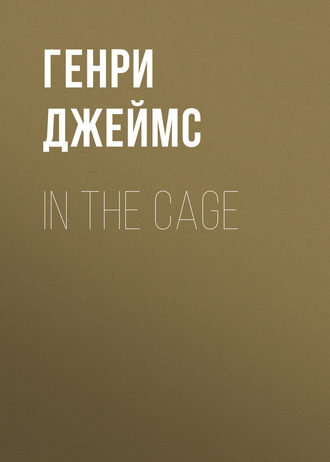
Генри Джеймс
In the Cage
CHAPTER V
This was neither more nor less than the queer extension of her experience, the double life that, in the cage, she grew at last to lead. As the weeks went on there she lived more and more into the world of whiffs and glimpses, she found her divinations work faster and stretch further. It was a prodigious view as the pressure heightened, a panorama fed with facts and figures, flushed with a torrent of colour and accompanied with wondrous world-music. What it mainly came to at this period was a picture of how London could amuse itself; and that, with the running commentary of a witness so exclusively a witness, turned for the most part to a hardening of the heart. The nose of this observer was brushed by the bouquet, yet she could never really pluck even a daisy. What could still remain fresh in her daily grind was the immense disparity, the difference and contrast, from class to class, of every instant and every motion. There were times when all the wires in the country seemed to start from the little hole-and-corner where she plied for a livelihood, and where, in the shuffle of feet, the flutter of “forms,” the straying of stamps and the ring of change over the counter, the people she had fallen into the habit of remembering and fitting together with others, and of having her theories and interpretations of, kept up before her their long procession and rotation. What twisted the knife in her vitals was the way the profligate rich scattered about them, in extravagant chatter over their extravagant pleasures and sins, an amount of money that would have held the stricken household of her frightened childhood, her poor pinched mother and tormented father and lost brother and starved sister, together for a lifetime. During her first weeks she had often gasped at the sums people were willing to pay for the stuff they transmitted—the “much love”s, the “awful” regrets, the compliments and wonderments and vain vague gestures that cost the price of a new pair of boots. She had had a way then of glancing at the people’s faces, but she had early learnt that if you became a telegraphist you soon ceased to be astonished. Her eye for types amounted nevertheless to genius, and there were those she liked and those she hated, her feeling for the latter of which grew to a positive possession, an instinct of observation and detection. There were the brazen women, as she called them, of the higher and the lower fashion, whose squanderings and graspings, whose struggles and secrets and love-affairs and lies, she tracked and stored up against them till she had at moments, in private, a triumphant vicious feeling of mastery and ease, a sense of carrying their silly guilty secrets in her pocket, her small retentive brain, and thereby knowing so much more about them than they suspected or would care to think. There were those she would have liked to betray, to trip up, to bring down with words altered and fatal; and all through a personal hostility provoked by the lightest signs, by their accidents of tone and manner, by the particular kind of relation she always happened instantly to feel.
There were impulses of various kinds, alternately soft and severe, to which she was constitutionally accessible and which were determined by the smallest accidents. She was rigid in general on the article of making the public itself affix its stamps, and found a special enjoyment in dealing to that end with some of the ladies who were too grand to touch them. She had thus a play of refinement and subtlety greater, she flattered herself, than any of which she could be made the subject; and though most people were too stupid to be conscious of this it brought her endless small consolations and revenges. She recognised quite as much those of her sex whom she would have liked to help, to warn, to rescue, to see more of; and that alternative as well operated exactly through the hazard of personal sympathy, her vision for silver threads and moonbeams and her gift for keeping the clues and finding her way in the tangle. The moonbeams and silver threads presented at moments all the vision of what poor she might have made of happiness. Blurred and blank as the whole thing often inevitably, or mercifully, became, she could still, through crevices and crannies, be stupefied, especially by what, in spite of all seasoning, touched the sorest place in her consciousness, the revelation of the golden shower flying about without a gleam of gold for herself. It remained prodigious to the end, the money her fine friends were able to spend to get still more, or even to complain to fine friends of their own that they were in want. The pleasures they proposed were equalled only by those they declined, and they made their appointments often so expensively that she was left wondering at the nature of the delights to which the mere approaches were so paved with shillings. She quivered on occasion into the perception of this and that one whom she would on the chance have just simply liked to be. Her conceit, her baffled vanity, was possibly monstrous; she certainly often threw herself into a defiant conviction that she would have done the whole thing much better. But her greatest comfort, mostly, was her comparative vision of the men; by whom I mean the unmistakeable gentlemen, for she had no interest in the spurious or the shabby and no mercy at all for the poor. She could have found a sixpence, outside, for an appearance of want; but her fancy, in some directions so alert, had never a throb of response for any sign of the sordid. The men she did track, moreover, she tracked mainly in one relation, the relation as to which the cage convinced her, she believed, more than anything else could have done, that it was quite the most diffused.
She found her ladies, in short, almost always in communication with her gentlemen, and her gentlemen with her ladies, and she read into the immensity of their intercourse stories and meanings without end. Incontestably she grew to think that the men cut the best figure; and in this particular, as in many others, she arrived at a philosophy of her own, all made up of her private notations and cynicisms. It was a striking part of the business, for example, that it was much more the women, on the whole, who were after the men than the men who were after the women: it was literally visible that the general attitude of the one sex was that of the object pursued and defensive, apologetic and attenuating, while the light of her own nature helped her more or less to conclude as to the attitude of the other. Perhaps she herself a little even fell into the custom of pursuit in occasionally deviating only for gentlemen from her high rigour about the stamps. She had early in the day made up her mind, in fine, that they had the best manners; and if there were none of them she noticed when Captain Everard was there, there were plenty she could place and trace and name at other times, plenty who, with their way of being “nice” to her, and of handling, as if their pockets were private tills loose mixed masses of silver and gold, were such pleasant appearances that she could envy them without dislike. They never had to give change—they only had to get it. They ranged through every suggestion, every shade of fortune, which evidently included indeed lots of bad luck as well as of good, declining even toward Mr. Mudge and his bland firm thrift, and ascending, in wild signals and rocket-flights, almost to within hail of her highest standard. So from month to month she went on with them all, through a thousand ups and downs and a thousand pangs and indifferences. What virtually happened was that in the shuffling herd that passed before her by far the greater part only passed—a proportion but just appreciable stayed. Most of the elements swam straight away, lost themselves in the bottomless common, and by so doing really kept the page clear. On the clearness therefore what she did retain stood sharply out; she nipped and caught it, turned it over and interwove it.
CHAPTER VI
She met Mrs. Jordan when she could, and learned from her more and more how the great people, under her gentle shake and after going through everything with the mere shops, were waking up to the gain of putting into the hands of a person of real refinement the question that the shop-people spoke of so vulgarly as that of the floral decorations. The regular dealers in these decorations were all very well; but there was a peculiar magic in the play of taste of a lady who had only to remember, through whatever intervening dusk, all her own little tables, little bowls and little jars and little other arrangements, and the wonderful thing she had made of the garden of the vicarage. This small domain, which her young friend had never seen, bloomed in Mrs. Jordan’s discourse like a new Eden, and she converted the past into a bank of violets by the tone in which she said “Of course you always knew my one passion!” She obviously met now, at any rate, a big contemporary need, measured what it was rapidly becoming for people to feel they could trust her without a tremor. It brought them a peace that—during the quarter of an hour before dinner in especial—was worth more to them than mere payment could express. Mere payment, none the less, was tolerably prompt; she engaged by the month, taking over the whole thing; and there was an evening on which, in respect to our heroine, she at last returned to the charge. “It’s growing and growing, and I see that I must really divide the work. One wants an associate—of one’s own kind, don’t you know? You know the look they want it all to have?—of having come, not from a florist, but from one of themselves. Well, I’m sure you could give it—because you are one. Then we should win. Therefore just come in with me.”
“And leave the P.O.?”
“Let the P.O. simply bring you your letters. It would bring you lots, you’d see: orders, after a bit, by the score.” It was on this, in due course, that the great advantage again came up: “One seems to live again with one’s own people.” It had taken some little time (after their having parted company in the tempest of their troubles and then, in the glimmering dawn, finally sighted each other again) for each to admit that the other was, in her private circle, her only equal, but the admission came, when it did come, with an honest groan; and since equality was named, each found much personal profit in exaggerating the other’s original grandeur. Mrs. Jordan was ten years the older, but her young friend was struck with the smaller difference this now made: it had counted otherwise at the time when, much more as a friend of her mother’s, the bereaved lady, without a penny of provision and with stopgaps, like their own, all gone, had, across the sordid landing on which the opposite doors of the pair of scared miseries opened and to which they were bewilderedly bolted, borrowed coals and umbrellas that were repaid in potatoes and postage-stamps. It had been a questionable help, at that time, to ladies submerged, floundering, panting, swimming for their lives, that they were ladies; but such an advantage could come up again in proportion as others vanished, and it had grown very great by the time it was the only ghost of one they possessed. They had literally watched it take to itself a portion of the substance of each that had departed; and it became prodigious now, when they could talk of it together, when they could look back at it across a desert of accepted derogation, and when, above all, they could together work up a credulity about it that neither could otherwise work up. Nothing was really so marked as that they felt the need to cultivate this legend much more after having found their feet and stayed their stomachs in the ultimate obscure than they had done in the upper air of mere frequent shocks. The thing they could now oftenest say to each other was that they knew what they meant; and the sentiment with which, all round, they knew it was known had well-nigh amounted to a promise not again to fall apart.
Mrs. Jordan was at present fairly dazzling on the subject of the way that, in the practice of her fairy art, as she called it, she more than peeped in—she penetrated. There was not a house of the great kind—and it was of course only a question of those, real homes of luxury—in which she was not, at the rate such people now had things, all over the place. The girl felt before the picture the cold breath of disinheritance as much as she had ever felt it in the cage; she knew moreover how much she betrayed this, for the experience of poverty had begun, in her life, too early, and her ignorance of the requirements of homes of luxury had grown, with other active knowledge, a depth of simplification. She had accordingly at first often found that in these colloquies she could only pretend she understood. Educated as she had rapidly been by her chances at Cocker’s, there were still strange gaps in her learning—she could never, like Mrs. Jordan, have found her way about one of the “homes.” Little by little, however, she had caught on, above all in the light of what Mrs. Jordan’s redemption had materially made of that lady, giving her, though the years and the struggles had naturally not straightened a feature, an almost super-eminent air. There were women in and out of Cocker’s who were quite nice and who yet didn’t look well; whereas Mrs. Jordan looked well and yet, with her extraordinarily protrusive teeth, was by no means quite nice. It would seem, mystifyingly, that it might really come from all the greatness she could live with. It was fine to hear her talk so often of dinners of twenty and of her doing, as she said, exactly as she liked with them. She spoke as if, for that matter, she invited the company. “They simply give me the table—all the rest, all the other effects, come afterwards.”
CHAPTER VII
“Then you do see them?” the girl again asked.
Mrs. Jordan hesitated, and indeed the point had been ambiguous before. “Do you mean the guests?”
Her young friend, cautious about an undue exposure of innocence, was not quite sure. “Well—the people who live there.”
“Lady Ventnor? Mrs. Bubb? Lord Rye? Dear, yes. Why they like one.”
“But does one personally know them?” our young lady went on, since that was the way to speak. “I mean socially, don’t you know?—as you know me.”
“They’re not so nice as you!” Mrs. Jordan charmingly cried. “But I shall see more and more of them.”
Ah this was the old story. “But how soon?”
“Why almost any day. Of course,” Mrs. Jordan honestly added, “they’re nearly always out.”
“Then why do they want flowers all over?”
“Oh that doesn’t make any difference.” Mrs. Jordan was not philosophic; she was just evidently determined it shouldn’t make any. “They’re awfully interested in my ideas, and it’s inevitable they should meet me over them.”
Her interlocutress was sturdy enough. “What do you call your ideas?”
Mrs. Jordan’s reply was fine. “If you were to see me some day with a thousand tulips you’d discover.”
“A thousand?”—the girl gaped at such a revelation of the scale of it; she felt for the instant fairly planted out. “Well, but if in fact they never do meet you?” she none the less pessimistically insisted.
“Never? They often do—and evidently quite on purpose. We have grand long talks.”
There was something in our young lady that could still stay her from asking for a personal description of these apparitions; that showed too starved a state. But while she considered she took in afresh the whole of the clergyman’s widow. Mrs. Jordan couldn’t help her teeth, and her sleeves were a distinct rise in the world. A thousand tulips at a shilling clearly took one further than a thousand words at a penny; and the betrothed of Mr. Mudge, in whom the sense of the race for life was always acute, found herself wondering, with a twinge of her easy jealousy, if it mightn’t after all then, for her also, be better—better than where she was—to follow some such scent. Where she was was where Mr. Buckton’s elbow could freely enter her right side and the counter-clerk’s breathing—he had something the matter with his nose—pervade her left ear. It was something to fill an office under Government, and she knew but too well there were places commoner still than Cocker’s; but it needed no great range of taste to bring home to her the picture of servitude and promiscuity she couldn’t but offer to the eye of comparative freedom. She was so boxed up with her young men, and anything like a margin so absent, that it needed more art than she should ever possess to pretend in the least to compass, with any one in the nature of an acquaintance—say with Mrs. Jordan herself, flying in, as it might happen, to wire sympathetically to Mrs. Bubb—an approach to a relation of elegant privacy. She remembered the day when Mrs. Jordan had, in fact, by the greatest chance, come in with fifty-three words for Lord Rye and a five-pound note to change. This had been the dramatic manner of their reunion—their mutual recognition was so great an event. The girl could at first only see her from the waist up, besides making but little of her long telegram to his lordship. It was a strange whirligig that had converted the clergyman’s widow into such a specimen of the class that went beyond the sixpence.
Nothing of the occasion, all the more, had ever become dim; least of all the way that, as her recovered friend looked up from counting, Mrs. Jordan had just blown, in explanation, through her teeth and through the bars of the cage: “I do flowers, you know.” Our young woman had always, with her little finger crooked out, a pretty movement for counting; and she had not forgotten the small secret advantage, a sharpness of triumph it might even have been called, that fell upon her at this moment and avenged her for the incoherence of the message, an unintelligible enumeration of numbers, colours, days, hours. The correspondence of people she didn’t know was one thing; but the correspondence of people she did had an aspect of its own for her even when she couldn’t understand it. The speech in which Mrs. Jordan had defined a position and announced a profession was like a tinkle of bluebells; but for herself her one idea about flowers was that people had them at funerals, and her present sole gleam of light was that lords probably had them most. When she watched, a minute later, through the cage, the swing of her visitor’s departing petticoats, she saw the sight from the waist down; and when the counter-clerk, after a mere male glance, remarked, with an intention unmistakeably low, “Handsome woman!” she had for him the finest of her chills: “She’s the widow of a bishop.” She always felt, with the counter-clerk, that it was impossible sufficiently to put it on; for what she wished to express to him was the maximum of her contempt, and that element in her nature was confusedly stored. “A bishop” was putting it on, but the counter-clerk’s approaches were vile. The night, after this, when, in the fulness of time, Mrs. Jordan mentioned the grand long talks, the girl at last brought out: “Should I see them?—I mean if I were to give up everything for you.”
Mrs. Jordan at this became most arch. “I’d send you to all the bachelors!”
Our young lady could be reminded by such a remark that she usually struck her friend as pretty. “Do they have their flowers?”
“Oceans. And they’re the most particular.” Oh it was a wonderful world. “You should see Lord Rye’s.”
“His flowers?”
“Yes, and his letters. He writes me pages on pages—with the most adorable little drawings and plans. You should see his diagrams!”
CHAPTER VIII
The girl had in course of time every opportunity to inspect these documents, and they a little disappointed her; but in the mean while there had been more talk, and it had led to her saying, as if her friend’s guarantee of a life of elegance were not quite definite: “Well, I see every one at my place.”
“Every one?”
“Lots of swells. They flock. They live, you know, all round, and the place is filled with all the smart people, all the fast people, those whose names are in the papers—mamma has still The Morning Post—and who come up for the season.”
Mrs. Jordan took this in with complete intelligence. “Yes, and I dare say it’s some of your people that I do.”
Her companion assented, but discriminated. “I doubt if you ‘do’ them as much as I! Their affairs, their appointments and arrangements, their little games and secrets and vices—those things all pass before me.”
This was a picture that could make a clergyman’s widow not imperceptibly gasp; it was in intention moreover something of a retort to the thousand tulips. “Their vices? Have they got vices?”
Our young critic even more overtly stared then with a touch of contempt in her amusement: “Haven’t you found that out?” The homes of luxury then hadn’t so much to give. “I find out everything.”
Mrs. Jordan, at bottom a very meek person, was visibly struck. “I see. You do ‘have’ them.”
“Oh I don’t care! Much good it does me!”
Mrs. Jordan after an instant recovered her superiority. “No—it doesn’t lead to much.” Her own initiations so clearly did. Still—after all; and she was not jealous: “There must be a charm.”
“In seeing them?” At this the girl suddenly let herself go. “I hate them. There’s that charm!”
Mrs. Jordan gaped again. “The real ‘smarts’?”
“Is that what you call Mrs. Bubb? Yes—it comes to me; I’ve had Mrs. Bubb. I don’t think she has been in herself, but there are things her maid has brought. Well, my dear!”—and the young person from Cocker’s, recalling these things and summing them up, seemed suddenly to have much to say. She didn’t say it, however; she checked it; she only brought out: “Her maid, who’s horrid—she must have her!” Then she went on with indifference: “They’re too real! They’re selfish brutes.”
Mrs. Jordan, turning it over, adopted at last the plan of treating it with a smile. She wished to be liberal. “Well, of course, they do lay it out.”
“They bore me to death,” her companion pursued with slightly more temperance.
But this was going too far. “Ah that’s because you’ve no sympathy!”
The girl gave an ironic laugh, only retorting that nobody could have any who had to count all day all the words in the dictionary; a contention Mrs. Jordan quite granted, the more that she shuddered at the notion of ever failing of the very gift to which she owed the vogue—the rage she might call it—that had caught her up. Without sympathy—or without imagination, for it came back again to that—how should she get, for big dinners, down the middle and toward the far corners at all? It wasn’t the combinations, which were easily managed: the strain was over the ineffable simplicities, those that the bachelors above all, and Lord Rye perhaps most of any, threw off—just blew off like cigarette-puffs—such sketches of. The betrothed of Mr. Mudge at all events accepted the explanation, which had the effect, as almost any turn of their talk was now apt to have, of bringing her round to the terrific question of that gentleman. She was tormented with the desire to get out of Mrs. Jordan, on this subject, what she was sure was at the back of Mrs. Jordan’s head; and to get it out of her, queerly enough, if only to vent a certain irritation at it. She knew that what her friend would already have risked if she hadn’t been timid and tortuous was: “Give him up—yes, give him up: you’ll see that with your sure chances you’ll be able to do much better.”
Our young woman had a sense that if that view could only be put before her with a particular sniff for poor Mr. Mudge she should hate it as much as she morally ought. She was conscious of not, as yet, hating it quite so much as that. But she saw that Mrs. Jordan was conscious of something too, and that there was a degree of confidence she was waiting little by little to arrive at. The day came when the girl caught a glimpse of what was still wanting to make her friend feel strong; which was nothing less than the prospect of being able to announce the climax of sundry private dreams. The associate of the aristocracy had personal calculations—matter for brooding and dreaming, even for peeping out not quite hopelessly from behind the window-curtains of lonely lodgings. If she did the flowers for the bachelors, in short, didn’t she expect that to have consequences very different from such an outlook at Cocker’s as she had pronounced wholly desperate? There seemed in very truth something auspicious in the mixture of bachelors and flowers, though, when looked hard in the eye, Mrs. Jordan was not quite prepared to say she had expected a positive proposal from Lord Rye to pop out of it. Our young woman arrived at last, none the less, at a definite vision of what was in her mind. This was a vivid foreknowledge that the betrothed of Mr. Mudge would, unless conciliated in advance by a successful rescue, almost hate her on the day she should break a particular piece of news. How could that unfortunate otherwise endure to hear of what, under the protection of Lady Ventnor, was after all so possible.






